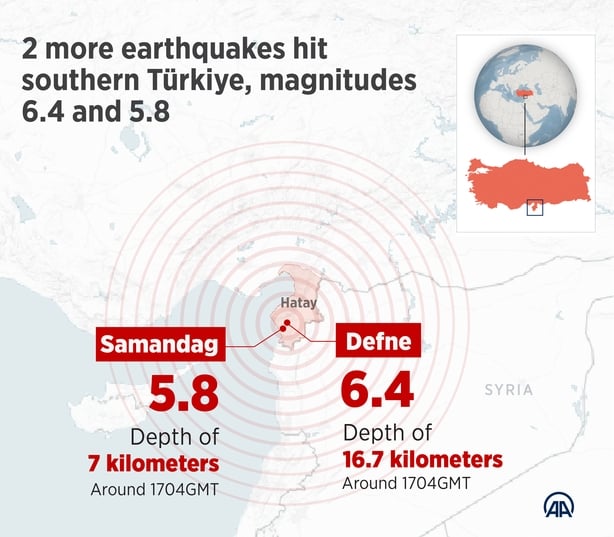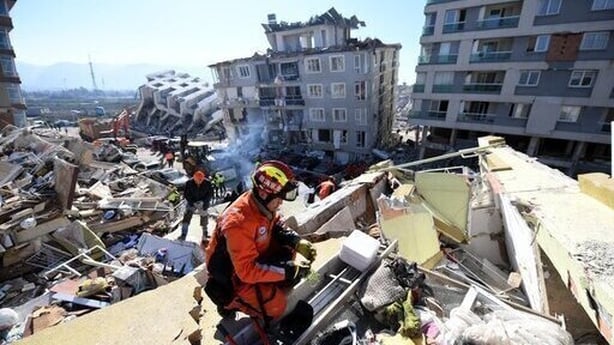A 6.4-magnitude earthquake has rocked Turkey's southern province of Hatay and northern Syria, killing six people and sparking fresh panic after a massive tremor on 6 February left nearly 45,000 dead in both countries.
The AFAD disaster response agency reported the deaths as well as nearly 300 hospitalisations, while in Syria the White Helmets aid group said at least 150 people were injured in the Aleppo region.
Yesterday's quake hit the Turkish town of Defne at 8.04pm local time and was strongly felt by AFP teams in the nearby city of Antakya. It was also felt in Lebanon.
Turkey's disaster management agency said on Twitter that a 5.8-magnitude quake followed three minutes later, with its epicentre in the Samandag district of Hatay province.
The agency recorded two more tremors with magnitudes of 5.2 around 20 minutes after the first yesterday.
Images from DHA news agency showed a hospital in Antakya being evacuated, while broadcaster NTV reported that a hospital was evacuated in the city of Iskenderun.
DHA said patients in an intensive care unit were taken by ambulance to field hospitals to continue their treatment.
Soylu said rescue workers were trying to find people trapped under rubble.

'Earth opening up'
An AFP journalist reported scenes of panic in Antakya, with the new tremors raising clouds of dust in the devastated city.
The walls of badly damaged buildings crumbled while several people, apparently injured, called for help.
On a street in Antakya, Ali Mazlum, 18, told AFP: "We were with AFAD who were looking for the bodies of our family when the quake hit.
"You don't know what to do... we grabbed each other and right in front of us, the walls started to fall. It felt like the earth was opening up to swallow us up."
Mr Mazlum, who has lived in Antakya for 12 years, was looking for the bodies of his sister and her family as well as his brother-in-law and his family.
'No longer safe'
"The road moved like waves. The building moved back and forth, the cars moved left to right. It knocked me off my feet," said Mehmet Irmak, who works at a notary's office in Antakya.
"Hatay is no longer a safe place. We could hear a lot of buildings collapsing... We will wait for a new day, but I don't know what I'm going to do," added Irmak, who had been sleeping in his car for two weeks after the first quake.
The Syrian American Medical Society (SAMS) said five hospitals it supports in northwest Syria received several people who had sustained minor injuries, some when parts of damaged buildings fell on them.
In government-held areas of Syria, Aleppo hospitals also received panic-stricken residents, while six people were injured by falling rubble, the state news agency SANA said.
Al Razi hospital in Aleppo received 47 cases, state media reported.
"We rushed out, we don't know how we left. I was afraid that we would meet the same fate as those who died under the rubble," said Khadija Al Khalaf, a 45-year-old mother, in the rebel-held city of Azaz.

'Trauma compounded'
Angus Lambkin, from the United Nations Disaster Assessment and Co-ordination team, has said the trauma that is being felt by the affected populations is being compounded by the latest earthquakes.
Speaking on RTÉ's Morning Ireland, he said people are wondering where they can feel safe.
He said that many international rescue teams were getting ready to leave the area when the latest earthquakes struck.
"This happened also at a time when the international search and rescue capacity was in the process of being stood down," Mr Lambkin said.
"So, they were preparing to leave and also what happened at a time when the movement of the national capacity wasn't necessarily focused on that particular area."
Mr Lambkin, who is in Malatya in Turkey, said: "There's been a big mobilisation, nationally speaking, to ensure that tents are available for anyone who's lost their home shelter following this.
"And indeed, consideration is now ongoing as to whether or not there needs to be a return of international capacity."
He added that the effect of the latest earthquake is "not as serious" as the previous earthquakes as many people were living in tents already, which has "reduced significantly" the risks associated with an earthquake, so the number of people killed is "significantly lower".
"We need to think about how these risks are managed as we move forward into that massive humanitarian response operation that is needed for the two earthquakes that occurred on the 6 February."
He said that while the death toll is low for the latest earthquake, the number of dead could rise.
Mr Lambkin explained that there is a process of understanding which buildings need to be demolished, which buildings can be renovated, which buildings might serve as shelter purpose again, and this process is ongoing.
This will also need to be reassessed due to the latest earthquake, he said, as it may well have undermined the structure and integrity of those buildings.
"So all of that work will need to be to be redone, to give people a sense of the viability of returning to their homes and to give those planning the shelter options," he said.
"They'll all need to relook at their figures, relook at their strategies and redevelop their plans accordingly."
"The magnitude of these events, and also them happening so close together, does mean that the international support both in terms of search and rescue and in terms of humanitarian support for the affected populations very much needs to be sustained."
Aftershocks
According to AFAD, more than 6,200 aftershocks have been recorded since the 7.8-magnitude hit Turkey and Syria on 6 February, leaving millions homeless.
Officials said after the quake that aftershocks would be felt for a year because of the force of the first tremor.
Officials have set the death tool from that quake at 41,156 people in Turkey and 3,688 in Syria, but experts say the number will rise as the rubble is cleared and rescue operations end.
Eleven provinces in Turkey were hit by the previous tremors and on Sunday, officials said rescue operations would continue in only two: Hatay and Kahramanmaras.
"My thoughts continue to be with the people of Turkiye and Syria, as they face the impact of new earthquakes striking the region this evening," wrote UN chief Antonio Guterres on Twitter.
UN teams there "are assessing the situation, and we stand ready to provide additional support as needed", he said.
Earlier yesterday, US Secretary of State Antony Blinken held talks in Ankara with Turkish President Recep Tayyip Erdogan and Foreign Minister Mevlüt Çavuşoğlu, as he wrapped up a visit during which he pledged solidarity after the tremors.
The United States has contributed $185 million in assistance to Turkey and Syria.

